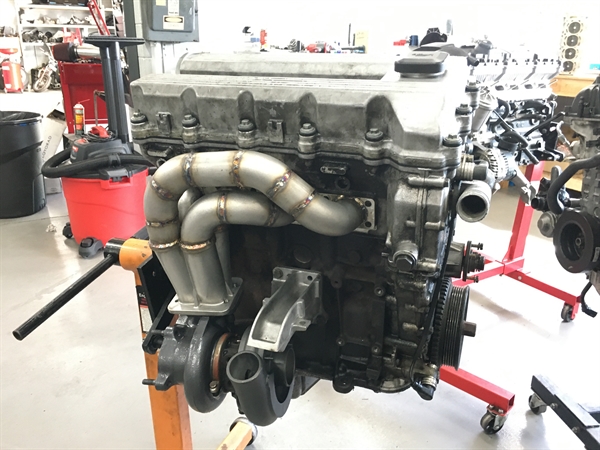BMW 318ti: A Comprehensive Overview to This Compact Giant
BMW 318ti: A Comprehensive Overview to This Compact Giant
Blog Article
Important Considerations for Picking the Ideal Engine for Your Needs
In the world of choosing the perfect engine to fulfill your demands, several essential aspects need meticulous factor to consider to make certain optimal performance and effectiveness. From the nuanced equilibrium in between power and performance to the often-overlooked aspects of upkeep and solution requirements, each aspect plays a pivotal function in determining one of the most suitable engine for your particular demands. As the complexity of engine innovations continues to advance, discerning the most suitable option demands a deep understanding of the interplay between numerous factors to consider. By discovering the detailed internet of elements that underpin this decision-making process, a clearer course arises in the direction of choosing an engine that not only fulfills but surpasses your assumptions.
Power and Performance
When assessing engines for optimal performance, it is essential to prioritize both power output and performance. Power output measures the ability of an engine to create power, which directly affects its performance. A high power result is vital for requiring jobs such as high-speed requirements or sturdy applications. It makes sure that the engine can manage the workload properly and efficiently. Nevertheless, power alone is not sufficient; performance plays a considerable role in determining the general efficiency of an engine. Effectiveness refers to just how well the engine transforms fuel right into usable power. An extra efficient engine will supply much better mileage, reduced emissions, and decreased operating expense. Striking the right equilibrium in between power result and performance is key to picking an engine that fulfills your specific demands. When making this decision, it is necessary to think about aspects such as the planned usage of the engine, ecological effect, and long-lasting cost ramifications. By thoroughly assessing both power and effectiveness, you can select an engine that supplies optimum efficiency and fulfills your demands properly.
Fuel Performance and Economy
Gas performance refers to the engine's ability to transform fuel right into power with very little waste, straight influencing operating prices and environmental sustainability. Engines with higher fuel performance not just reduce gas expenditures yet additionally lower carbon discharges, adding to a greener operation.

Compatibility and Application
Thinking about the fuel performance and economic situation of an engine, the following vital aspect to address is its compatibility and application within particular functional contexts. Compatibility refers to exactly how well the engine incorporates with the navigate to this website total system or devices it powers.
In addition, the application of the engine is just as essential. Different engines are developed for particular objectives, whether it be industrial machinery, aquatic vessels, automobiles, or power generators. Comprehending the intended application permits for the choice of an engine that can deliver the necessary power result, torque, and operational characteristics. A high-revving engine made for efficiency autos would not be suitable for sturdy building and construction tools that needs high torque at reduced speeds.
Maintenance and Service Needs
Maintenance and solution needs play a crucial function in ensuring the long life and optimum efficiency of an engine. Regular upkeep is essential to protect against breakdowns, prolong the life-span of the engine, and preserve its performance. When selecting an engine, it is essential to take into consideration the supplier's advised maintenance routine and the availability of service facilities or certified professionals.
Factors such as the frequency of oil changes, filter substitutes, and overall evaluations can considerably influence the engine's performance. Some engines may call for even more frequent maintenance based on their style and use, while others may have longer periods in between upkeep checks. It is essential to comply with these solution needs to prevent expensive repair work and unforeseen downtime.

Expense and Budget Factors To Consider
Spending plan restraints usually play a considerable duty in the decision-making procedure when picking an engine for a certain application. When thinking about the expense and budget implications of choosing an engine, it is vital to examine not only the preliminary purchase cost however also the long-term costs connected with maintenance, fuel consumption, and prospective upgrades or fixings. It is critical to strike an equilibrium between the ahead of time price of the engine and its overall lifecycle prices to guarantee that the chosen engine continues to be financially lasting throughout its operational life expectancy.
Elements such as fuel reliability, performance, and longevity can directly influence the total cost of ownership of an engine. While an extra costly engine may have higher upfront expenses, it can possibly result in lower maintenance and fuel expenses over time, thus offering better worth in the long run.
Conclusion

Fuel performance refers to the engine's capacity to convert fuel right into energy with very little waste, straight influencing operating expenses and ecological sustainability.Factors affecting fuel efficiency include engine style, burning efficiency, and total efficiency optimization. Furthermore, picking the proper gas type and quality as recommended by the engine supplier can additionally improve efficiency and lengthen engine life expectancy.
Engines with excellent use features and conveniently available components can minimize maintenance prices and decrease the time the engine is out of operation - bmw 318ti. It is important to strike a balance in between the ahead of time expense of the engine and its overall lifecycle expenses to make certain that the chosen engine remains financially sustainable throughout its functional lifespan
Report this page